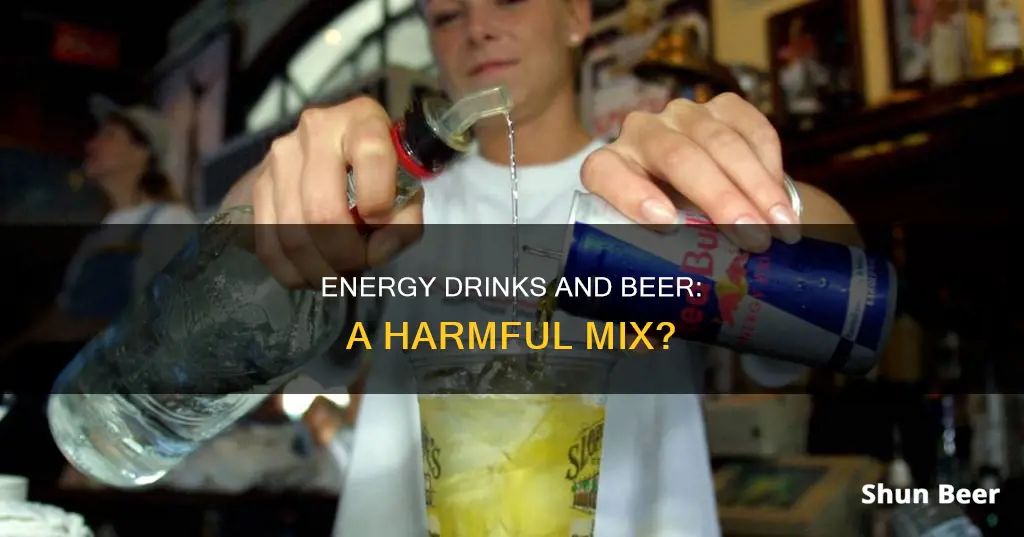
Drinking too much of anything is usually harmful, but when it comes to Red Bull and beer, there are reasons to be cautious. Red Bull is a highly caffeinated, sugar-sweetened drink, and beer is an alcoholic beverage. Both can have negative effects on the body, especially when consumed together and in large quantities. Excessive intake of Red Bull has been linked to increased blood pressure and heart rate, type 2 diabetes, tooth decay, kidney problems, high-risk behaviour, caffeine overdose, and in rare cases, even heart attacks and death. Beer, on the other hand, is known to have diuretic effects, leading to dehydration, and excessive consumption can cause weight gain, impaired judgment, and in severe cases, alcohol poisoning and liver damage. Mixing the two can be especially dangerous, as the caffeine in Red Bull can mask the effects of alcohol, leading to increased consumption and risk-taking behaviour. While moderate and occasional intake of either drink may not cause serious issues in healthy adults, it's important to be aware of the potential risks associated with excessive consumption.
| Characteristics | Values |
|---|---|
| Increased risk of heart disease | High levels of caffeine can cause an increase in blood pressure and heart rate, leading to an increased risk of heart disease, including irregular heartbeat and high blood pressure. |
| Dehydration | High levels of sugar or artificial sweeteners along with caffeine can lead to dehydration, causing fatigue, headaches, and decreased cognitive function. |
| Weight gain | High levels of calories and sugar can lead to weight gain and an increased risk of obesity. Excessive sugar intake can also lead to insulin resistance and Type 2 diabetes. |
| Tooth decay | High levels of acid and sugar can erode tooth enamel and lead to tooth decay and long-term dental problems. |
| Insomnia | High levels of caffeine can interfere with sleep patterns, leading to insomnia and a lack of restful sleep. |
| Addiction | High levels of caffeine and sugar can make energy drinks addictive, leading to dependency and withdrawal symptoms if consumption is stopped suddenly. |
| Headaches | Caffeine causes the blood vessels in the brain to constrict, and when caffeine intake is stopped, the blood vessels dilate, increasing blood flow and triggering headaches. |
| Increased risk of high-risk behaviour | Research has shown an association between drinking Red Bull and increased high-risk behaviour, especially when combined with alcohol. |
| Increased risk of caffeine overdose | Drinking more than 5 cans of Red Bull per day could increase the risk of caffeine overdose. |
What You'll Learn
- Cardiovascular issues: irregular heartbeat, high blood pressure, and increased risk of heart disease
- Dehydration: high sugar and caffeine content can lead to dehydration, causing fatigue and headaches
- Weight gain and metabolic issues: high calories, sugar, and artificial sweeteners can cause weight gain and insulin resistance
- Dental problems: high acid and sugar content can erode tooth enamel and cause tooth decay
- Insomnia: high caffeine content can interfere with sleep patterns

Cardiovascular issues: irregular heartbeat, high blood pressure, and increased risk of heart disease
Drinking too much Red Bull and beer can be harmful to your health, and may cause cardiovascular issues such as irregular heartbeat, high blood pressure, and an increased risk of heart disease.
Red Bull is a highly caffeinated beverage, with one 8.4-ounce can containing 75-108 mg of caffeine, similar to a cup of coffee. Excessive caffeine intake can lead to increased heart rate and blood pressure. Studies have shown that drinking one 12-ounce can of Red Bull can significantly increase blood pressure and heart rate within 90 minutes, with effects lasting up to 24 hours. These increases are primarily attributed to the drink's high caffeine content. While moderate and occasional intake is unlikely to cause serious heart problems in healthy adults, excessive consumption, especially in younger individuals, has been linked to irregular heartbeat, heart attacks, and even death.
The combination of Red Bull and alcohol can also be dangerous. Caffeine can mask the effects of alcohol, leading individuals to feel less intoxicated while still experiencing alcohol-related impairments. This can result in increased high-risk behaviours, such as drinking and driving, and a greater risk of alcohol-related injuries.
In addition to the risks associated with caffeine, Red Bull also contains high levels of sugar. Excessive sugar intake, especially from sweetened beverages, has been linked to an increased risk of type 2 diabetes. As Red Bull contains 29 grams of sugar per 8.4-ounce serving, consuming one or more servings per day could increase the risk of developing type 2 diabetes.
The high caffeine and sugar content of Red Bull, coupled with its potential to be consumed in excess, particularly when mixed with alcohol, underscores the harmful effects it can have on cardiovascular health. This includes an increased risk of irregular heartbeat, high blood pressure, and heart disease. Therefore, it is important to consume Red Bull in moderation and be mindful of its potential risks, especially when combined with alcohol.
Beer and CAD: What You Need to Know
You may want to see also

Dehydration: high sugar and caffeine content can lead to dehydration, causing fatigue and headaches
Dehydration: A Harmful Consequence of Drinking Too Much Red Bull and Beer
Drinking too much Red Bull and beer can lead to dehydration, causing fatigue and headaches. This is due to the high sugar and caffeine content in these beverages.
Red Bull is a popular energy drink that contains caffeine, sugar, artificial sweeteners, and various stimulants such as taurine and guarana. While the occasional consumption of Red Bull may not be harmful, drinking it in large quantities or on a daily basis can have negative consequences for your health.
Beer, on the other hand, is an alcoholic beverage that also contains a significant amount of sugar. When consumed in excess, beer can contribute to dehydration, especially when coupled with the diuretic effects of alcohol.
The combination of high sugar and caffeine content in Red Bull and beer can lead to dehydration, which occurs when the body loses more fluid than it takes in. Dehydration can cause a range of unpleasant symptoms, including fatigue and headaches.
Fatigue is a feeling of tiredness or exhaustion that can affect your ability to perform daily tasks. It is often accompanied by a lack of energy and motivation. Headaches, on the other hand, are characterized by pain or discomfort in the head, scalp, or neck. They can vary in intensity and duration and may be triggered or worsened by dehydration.
To prevent dehydration, it is important to moderate your intake of Red Bull and beer and stay adequately hydrated by consuming enough water or other fluids. It is also worth noting that caffeine and alcohol can disrupt sleep patterns, so it is best to limit your consumption, especially close to bedtime, to avoid worsening dehydration symptoms.
In addition to dehydration, excessive consumption of Red Bull and beer can lead to other health issues such as weight gain, tooth decay, and an increased risk of heart disease. Therefore, it is crucial to consume these beverages in moderation and prioritize healthier alternatives such as filtered water, green tea, fresh fruit juice, or coconut water.
Pouring Beer: Understanding the Inner Workings of a Faucet
You may want to see also

Weight gain and metabolic issues: high calories, sugar, and artificial sweeteners can cause weight gain and insulin resistance
Drinking too much Red Bull and beer can be harmful to your health in several ways. Here, we will focus on the issue of weight gain and metabolic issues caused by high calories, sugar, and artificial sweeteners.
Red Bull is a highly caffeinated and sugary drink. A single 8.4-ounce (260-ml) can of Red Bull contains 29 grams of sugar. This is already a significant amount of sugar, and when consumed in excess, can contribute to weight gain. The high sugar content can also lead to insulin resistance and an increased risk of developing Type 2 diabetes. This is further exacerbated by the presence of artificial sweeteners in the sugar-free versions of Red Bull, such as Red Bull Zero and Red Bull Sugarfree, which use sucralose and acesulfame K as substitutes for sugar.
Research has shown that regular intake of artificial sweeteners is associated with an increased risk of Type 2 diabetes. A British Medical Journal study linked the artificial sweetener sucralose to Type 2 diabetes. This means that even the sugar-free versions of Red Bull may still increase the risk of developing metabolic issues.
Beer, on the other hand, is also known to be high in calories. A standard 12-ounce beer contains around 150 calories, with stronger beers containing even more. When consumed in moderation, beer may not significantly impact weight gain. However, when consumed in excess, the high calorie content can contribute to weight gain over time.
Excessive consumption of Red Bull and beer can lead to a significant calorie surplus, which can result in weight gain and obesity. This weight gain, coupled with the effects of high sugar and artificial sweetener consumption, can further increase the risk of insulin resistance and Type 2 diabetes. Therefore, it is important to consume these beverages in moderation and be mindful of their potential impact on weight gain and metabolic health.
Beer Drinking: Throat Cancer Risk and You
You may want to see also

Dental problems: high acid and sugar content can erode tooth enamel and cause tooth decay
Drinking too much Red Bull and beer can be harmful to your dental health. Both drinks contain high levels of acid and sugar, which can cause tooth decay and erode tooth enamel.
Tooth enamel is the hard, protective outer layer of your teeth. When this layer is damaged, your teeth become more susceptible to decay. A five-day test-tube study found that exposing human tooth enamel to energy drinks for 15 minutes, four times a day, resulted in significant and irreversible loss of tooth enamel. In fact, energy drinks were found to be twice as harmful to tooth enamel as soft drinks.
The high acid content in Red Bull and beer can also lead to enamel erosion. This erosion can cause your teeth to become more sensitive to temperature changes and increase your risk of developing cavities.
To protect your dental health, it is important to limit your consumption of Red Bull and beer. Additionally, drinking these beverages through a straw can help reduce their contact with your teeth. Maintaining proper oral hygiene practices, such as brushing and flossing regularly, can also help reduce the risk of dental problems.
Beer Belly Blues: Stomach Pain After Drinking Beer, Why?
You may want to see also

Insomnia: high caffeine content can interfere with sleep patterns
Drinking too much Red Bull and beer can be harmful due to the high caffeine content in Red Bull, which can interfere with sleep patterns and lead to insomnia.
The High Caffeine Content in Red Bull Can Disrupt Sleep Patterns
Red Bull is a highly caffeinated beverage, with one 8.4 fl oz can containing 80 mg of caffeine, equivalent to the amount in a cup of coffee. Caffeine is a central nervous system stimulant, and when consumed in excess, it can interfere with sleep patterns and cause insomnia. This is particularly true for individuals who drink Red Bull daily or in large quantities. The effects of caffeine on sleep can vary depending on factors such as age, body weight, and tolerance to caffeine. However, in general, it is recommended that caffeine intake be limited, especially close to bedtime, to avoid sleep disturbances.
Combining Red Bull and Beer Can Exacerbate Sleep Disturbances
When Red Bull is consumed in combination with beer or other alcoholic beverages, the risk of sleep disturbances may be even higher. Caffeine can mask the effects of alcohol, leading to a state of "wide-awake drunkenness," where individuals feel less intoxicated but still experience alcohol-related impairments. This can result in disrupted sleep patterns and insomnia. Additionally, the diuretic effects of caffeine and alcohol can contribute to dehydration, further impacting sleep quality.
Strategies to Mitigate Sleep Disturbances
To minimize the impact of Red Bull and beer consumption on sleep, it is advisable to limit caffeine intake, especially in the evening and close to bedtime. Switching to decaffeinated or caffeine-free beverages can help reduce the risk of sleep disturbances. Additionally, drinking plenty of water can help counteract the diuretic effects of caffeine and alcohol. Establishing a consistent sleep schedule, maintaining a relaxing bedtime routine, and creating a comfortable sleep environment can also promote better sleep.
Seeking Professional Help for Insomnia
If insomnia or sleep disturbances persist despite these strategies, it may be advisable to consult a healthcare professional or a sleep specialist. They can help identify any underlying sleep disorders and provide personalized advice and treatments to improve sleep quality. This may include cognitive-behavioural therapy for insomnia (CBT-I), sleep restriction therapy, or, in some cases, prescription sleep aids.
Beer Drinking: Why Do People Enjoy This Beverage?
You may want to see also
Frequently asked questions
Drinking Red Bull and beer together can be harmful. Research has shown that drinking Red Bull and alcohol together can lead to an increase in high-risk behaviour. Caffeine in Red Bull can mask the effects of alcohol, making you feel less intoxicated while still experiencing alcohol-related impairments. This can lead to serious consequences such as drink driving and alcohol-related injuries.
Drinking too much Red Bull can have several negative side effects on the body, including:
- Increased blood pressure and heart rate
- Increased risk of type 2 diabetes
- Tooth decay
- Negative impact on kidney health
- Caffeine overdose and toxicity
- Increased risk of heart disease
- Dehydration
- Weight gain
- Insomnia
- Addiction
- Headaches
According to the European Food Safety Authority (EFSA), a caffeine intake of up to 400 mg per day is considered safe for healthy adults. This amounts to about five 250 ml cans of Red Bull or five cups of coffee. However, pregnant and breastfeeding women should limit their caffeine intake to 200 mg.







